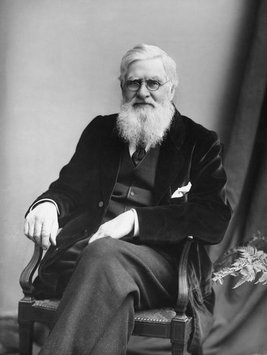|
Can you imagine what it must have been like to visit the tropical islands of the Dutch East Indies in the mid-1800s? Today we can fly to various tropical destinations, stay in plush resorts, and safely visit natural wonders with the help of English-speaking guides. Things were different 160 years ago, when the scientist Alfred Wallace journeyed to the Malay Archipelago and spent eight years collecting more than 100,000 insects, birds, and other animals, which he donated to British museums. Wallace wrote an amazing two-volume book describing his experiences. The book is titled "The Malay Archipelago," and you can get various ebook and print versions of it on Amazon and elsewhere (some of them are even free). I highly recommend this book. It is an eye-opening experience, and it may change the way you look at human nature. Although Wallace bore the Eurocentric prejudices typical of his time, he was an acute observer of native cultures and had the ability to recognize features of tribal life that were in some ways more admirable than his own “modern” society. He also nearly died numerous times from sickness, accidents, and violence.
Here’s the real kicker. During his travels, Wallace came up with the idea that living things evolve as they adapt to their environment. He did this independently from the famous Charles Darwin. Although Wallace had contemplated the idea for several years, the final clarifying details of it came to him when he was sick with fever on the island of Halmahera in 1858. He wrote a brief paper on it and sent it to Charles Darwin to review. Darwin had come up with the same theory, and this inspired him to act. The two men published a joint paper on it in 1858. They were friends, not rivals. A year later, Darwin wrote and published his book, "On the Origin of Species." This book made him famous, and Wallace faded to relative obscurity. Samuel Inwood, the main character in my new novel, Savage, is patterned after Alfred Wallace. In fact, Samuel was so inspired by Wallace’s journey that he embarked on his own expedition to New Guinea in 1868. As you can guess, things don’t go so well for Samuel. Not only is he forced to endure unthinkable hardships, he is compelled to reconsider what it means to be civilized. Is Samuel a civilized man, or is he a savage? After you read the book, I’d love to hear your thoughts on this.
0 Comments
There are many satisfying moments during the process of writing a novel. Each time you finish a chapter, for example. And when you finish the first complete draft. Or when you finally finish that fifteenth editing run-through and realize the story is about ready. But nothing can compare to that moment when the proof copy of the printed version of the book arrives in the mail and you hold it in your hands for the first time. Maybe it’s the book’s heft, or the glossy cover, or the smell of the pages. Or maybe it’s the countless hours of work it took to get to this point.
The cover image looks a little dark to me, but that tends to happen when you look at a printed version versus the digital on-screen version. So I am happy with it and will go ahead and approve it. The Kindle version of SAVAGE is already available, but the print version should show up on Amazon within a few days. Now its time to take a brief break by working for ten days at the Kansas State Fair (at the Original Beer Garden… stop by and say hello if you happen to be there), and then back to working on my next novel. It is tentatively titled PROFUSION and is the third novel in the Diffusion series. Amazon Author page: http://goo.gl/rojJEA |
Stan's Cogitations
Everyone needs a creative outlet. That's why I write. Archives
July 2024
|




 RSS Feed
RSS Feed